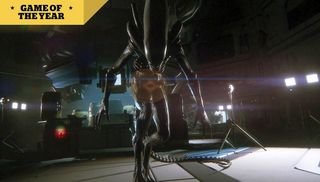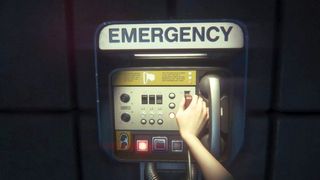
Check out our game of the year awards 2014 page to find out how the awards were decided.
Andy Kelly: Finally, someone made an Alien game based on the right film. The Creative Assembly obsessively broke Ridley Scott’s 1979 original down and used its component parts – one terrifying creature, a struggle for survival, a dark, claustrophobic setting – to make the best Alien game ever, and one of the best horror games ever. It’s probably the bravest, most subversive ‘AAA’ game of the year, and I’m really glad Sega took a gamble on it.
When I first heard about Isolation, I wondered if they’d be able to rest an entire game on that premise of a single alien stalker. But thanks to careful, considered pacing, and mixing up Amanda’s circumstances, it never outstayed its welcome, even after 25 hours. In one section the motion tracker is useless, in another you’re free to fire your weapons without alerting the beast. Little changes like this keep the game feeling varied, as does that reactive AI. I’ve played through the game twice now, and the alien still surprises and scares me.
It’s also one of the few games I actually felt compelled to seek out an art book for. In terms of design and craft, this is one of the best games, artistically, since Deus Ex: Human Revolution, which had a similar approach to its world design. Like the film, it’s a world that’s chunky and functional, rather than fancily futuristic.
Evan Lahti: After so many Alien games, it’s fascinating that it ends up being The Creative Assembly – a studio known for Total War, a series that couldn’t be much further away from a stealth FPS – that does something novel with a franchise that the industry has essentially banged its head against for the past decade. That’s one of the things we’re celebrating with this award, I think: that Isolation’s creative success could encourage others to take more deliberate attempts at adapting beloved source material, rather than just shoehorning licences into an action game.

Samuel Roberts: I went through the 25-hour story waiting for the moment when The Creative Assembly ran out of novel ways to use the alien’s extraordinary AI, but it never does. This could’ve been a six hour story that didn’t risk outstaying its welcome – instead, we got a sprawling epic where every interesting set piece you could imagine is explored, in a well-judged arc that demonstrates real skill with structure. And yeah, the fact that a studio with a strong legacy in strategy games pulled this off is one of the weirder things about Alien: Isolation, but that makes the story of its success all the more compelling.
Tony Ellis: Actually, I’d quibble your ‘dark, claustrophobic setting’, Andy. Maybe I just didn’t have my gamma settings down low enough, but the thing I really liked about Isolation was how effectively it showed us the alien in bright, unwavering light. Turning the lights off in horror films and games is a time-honoured practice, I know, and it’s a good one as far as it goes. We’re already afraid of the dark – hide your monster in it, half-glimpsed, lurking, and you capture the murky menace of a bad dream. But isn’t it more frightening if the lights are all on, you’re clearly not dreaming, and the monster is still there?
PC Gamer Newsletter
Sign up to get the best content of the week, and great gaming deals, as picked by the editors.
Giger’s creation is incongruous against such a backdrop, but that’s very much to the point. Alien is a film about a medieval altarpiece demon intruding into the sterile, moulded-plastic world of a science-fiction future, and refusing to go away. Massive yet sinuous, animated by an unguessable intelligence, Creative Assembly’s monster is scary enough and plausible enough to show us what that looks like.

Chris Thursten: Agreed: this is a philosophical victory for the source material as well as a practical one. And by ‘philosophical victory’ I mean ‘they have successfully realised the experience of being hunted through a submarine by an angry space penis’. Survival horror isn’t supposed to work this way: this is a genre defined by canned scares and set-pieces. Isolation is about the fear of being hunted by a system, a set of game mechanics that don’t care if you have a nice time. It’s a game that pushes up against the boundaries of what might be considered entertainment, because playing it can be a stressful, unpleasant experience. That’s a great and laudable risk to have taken, the total opposite of Aliens: Colonial Marines’ infantilisation of the series.
To the extent that we seek to send a message with our game of the year awards, ‘do this again’ is the takeaway here. Alien: Isolation picks up the threads left hanging by indie horror – AI monsters, little to no combat – and applies the resources and time afforded to mainstream development to solving them. Imagine if that could happen to the shooter, or the open-world game. Basically: imagine if all that time and money wasn’t locked to a template. That’s what we should be celebrating here.
For our full verdict on Alien, read our Alien: Isolation review.

It's Christmas. Would you like a free game? Of course you would! Thanks to our friends at Playfire, you can get a free Steam key right now. Follow the link for full details.
Hey folks, beloved mascot Coconut Monkey here representing the collective PC Gamer editorial team, who worked together to write this article! PC Gamer is the global authority on PC games—starting in 1993 with the magazine, and then in 2010 with this website you're currently reading. We have writers across the US, UK and Australia, who you can read about here.

